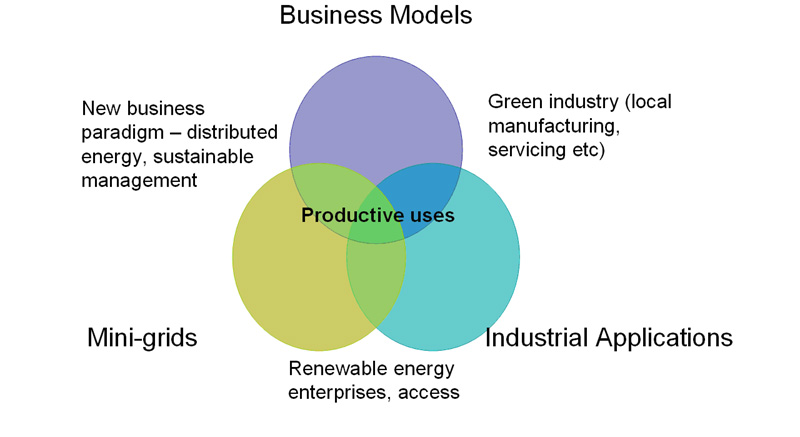Renewable energy sources provide an opportunity for developing countries and countries with economies in transition to embrace a low carbon pathway powered by innovative, smart and locally relevant energy solutions. Renewable energy has a great potential to help countries become less dependent on energy imports, create jobs and mitigate climate change while contributing to prosperity. In this context, UNIDO's energy-related activities include the promotion of renewable sources of energy, the facilitation of productive activities in rural areas and in industrial processes.
UNIDO's Renewable Energy Strategy aims at helping developing countries and countries in transition to achieve the following strategic outcomes:
- Mainstream the use of renewable energy in industrial applications, in particular in small and medium sized enterprises (SMEs), to increase their competitiveness and reduce dependence on fossil fuels;
- Create business development opportunities through increasing access to energy through mini-grids, by promoting renewable energy technologies;
- Support innovative business models promoting renewable energy as a business sector, thereby increase the viability of enterprises, particularly in rural areas, by augmenting the use of locally available renewable energy sources.
Mainstream the use of renewable energy in SMEs
SMEs constitute one of the main driving forces of economies in developing countries and countries with economies in transition. Besides providing a range of products and services, they are a significant job-creator. Due to their comparatively small size, however, their competitiveness is largely dependent on the infrastructure available to them and the costs of basic services such as electricity. In order to assure that SMEs can successfully engage in their productive activities, UNIDO focuses on promoting efficient patterns of energy use through renewable energy, such as fuel-switching from fossil fuels to locally available renewable sources. In designing any such action, the local conditions and needs as well as the available resources and capacities are carefully considered. Interventions for industrial applications of SMEs will consider all types of energy uses including motive power and process heat for low or high temperature applications.
UNIDO will also focus on building capacity at all levels for renewable energy technologies, such as for the production and assembly as well as maintenance of renewable energy technologies, to create jobs for servicing the renewable energy industry and for reducing costs of the technology. The projects will reinforce South-South cooperation.
Support innovative business models to promote renewable energy as a business sector
In order to accelerate the availability and use of renewable energy, UNIDO will also focus on fostering the potentials that are created by promoting renewable energy as a business sector. Business models for renewable energy production as a viable industry will thus be promoted, giving rise to energy entrepreneurs, independent power producers and converting agricultural industry into rural energy enterprises.
The idea of generating energy for one’s own use as well as for sale to a grid is already quite common in larger industrial plants and companies e.g. sugar industry in Brazil. However, the full spectrum of possibilities available to smaller-scale energy service providers – especially in terms of deployment of renewable energy in less accessible areas as well as in terms of a source of sustainable income – has a large potential for development. UNIDO will focus not only creating an enabling policy and market environment for such activities but also on the development of technical capacity and business skills. Here, Business Partnerships will be sought to ensure the creation of innovative business structures. Private sector participation is fundamental, but currently limited, due to the (perceived and real) risks arising from a lack of appropriate policy and regulatory frameworks and country conditions. UNIDO will ensure that all its projects include actions for de-risking investments to ensure projects are attractive to the private sector.
Create business development opportunities through increasing access to energy
The aim is to increase access to sustainable energy and services for a greater engagement in productive activities by the local population, through enabling income-generating activities. UNIDO’s efforts focus on promoting decentralized, off-grid solutions that fit the needs of the population concerned and contribute to their productive outputs, such as mini-grids in the electricity sector, as well as stand-alone renewable heating applications (solar thermal) and sustainable biofuels for transport.
Besides promoting the deployment of renewable energy solutions, UNIDO will focus on building capacity at all levels of renewable energy policy and the regulatory framework, so that communities, institutions and governments are able to create an enabling framework for the development of mini-grids based on renewable energy technologies.
